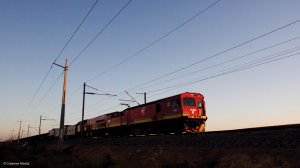TFR operating company head raises concern over ‘high tariff’ signalled in draft Network Statement

Transnet Freight Rail CEO Russell Baatjies tells MIPA chairperson Warwick Lord about his misgivings over the proposed rail tariff methodology, while underling efforts being made to keep TFROC and TRIM separated during the unbundling process. Editing: Shadwyn Dickinson. Recorded: 23.05.2024
Transnet Freight Rail (TFR) CEO Russell Baatjies has added his voice to industry-wide concerns being expressed about the high rail tariffs that would arise should the methodology included in a draft Network Statement be implemented.
The Network Statement was released for public comment in March by Transnet’s interim Infrastructure Manager (TRIM), which is being separated from the Transnet Freight Rail Operating Company, or TFROC, which Baatjies oversees.
As with any private train operating company, TFROC would be subjected to the same tariff methodology, about which customers and potential private operators have also expressed their anxiety.
Speaking during the launch of the Multimodal Inland Port Association (MIPA), Baatjies confirmed that TFROC had made a presentation to the Interim Rail Economic Regulatory Capacity (IRERC), which is considering the Network Statement, outlining TFROC’s unhappiness with the tariff.
“We think it’s very high and we don’t think you will have significant growth if we go with that tariff,” he said during the virtual event, which was hosted by the Transport Forum.
IRERC is expected to consolidate the comments received by stakeholders and prepare recommendations for consideration by the Transport Minister prior to the Network Statement being approved. In future, an independent Transport Economic Regulator will regulate both tariffs and access to the rail network, with the TRIM being the owner and operator of the network.
Baatjies insisted that “Chinese walls” had already been built between TRIM and TFROC, with the brand identity of the latter likely to be changed in the not-too-distant future to underline the distinction between the two entities that have hitherto been vertically integrated under TFR.
In response to a question posed by MIPA chairperson Warwick Lord above the level of independence of the TRIM, Baatjies responded that the separation was already being treated internally as entrenched.
As head of TFROC he had not signed-off on the draft Network Statement, which was approved instead by Transnet CEO Michelle Phillips, to whom the TRIM executives were also reporting.
“With the Network Statement, for instance, I did not sign off … and as TFROC, the operating company, we also had our comments about the Network Statement and some things that we think should be relooked at, for instance the tariff.
“[But] instead of influencing the process from inside, we are seeking to ensure that we keep the independence, and we are following the same process that other train operating companies will have to follow,” Baatjies said.
Speaking on the same platform, GAIN Group director and emeritus professor at Stellenbosch University, Jan Havenga, also underlined the unaffordability of the tariff, which he attributed to Transnet’s unsustainable debt levels and the large maintenance backlog.
“No company on its own can fix this, not if you have R130-billion-worth of debt, half of which is State capture debt … the government needs to step in,” Havenga averred.
Baatjies also used the platform to signal Transnet’s eagerness to integrate intermodal inland ports to improve the efficiency of rail and port operations, as well as to redirected rail-friendly cargo back from road.
He highlighted the success that had already been achieved in the manganese sector through collaboration between inland and back-of-port terminals, which had resulted in yearly export volumes rising from five-million tons to 15-million tons.
Lord said that MIPA had been established with the specific aim of supporting the movement of cargo from road to rail via inland ports, where freight volumes could be consolidated to lower overall distribution costs and improve capacity on existing networks.
Article Enquiry
Email Article
Save Article
Feedback
To advertise email advertising@creamermedia.co.za or click here
Press Office
Announcements
What's On
Subscribe to improve your user experience...
Option 1 (equivalent of R125 a month):
Receive a weekly copy of Creamer Media's Engineering News & Mining Weekly magazine
(print copy for those in South Africa and e-magazine for those outside of South Africa)
Receive daily email newsletters
Access to full search results
Access archive of magazine back copies
Access to Projects in Progress
Access to ONE Research Report of your choice in PDF format
Option 2 (equivalent of R375 a month):
All benefits from Option 1
PLUS
Access to Creamer Media's Research Channel Africa for ALL Research Reports, in PDF format, on various industrial and mining sectors
including Electricity; Water; Energy Transition; Hydrogen; Roads, Rail and Ports; Coal; Gold; Platinum; Battery Metals; etc.
Already a subscriber?
Forgotten your password?
Receive weekly copy of Creamer Media's Engineering News & Mining Weekly magazine (print copy for those in South Africa and e-magazine for those outside of South Africa)
➕
Recieve daily email newsletters
➕
Access to full search results
➕
Access archive of magazine back copies
➕
Access to Projects in Progress
➕
Access to ONE Research Report of your choice in PDF format
RESEARCH CHANNEL AFRICA
R4500 (equivalent of R375 a month)
SUBSCRIBEAll benefits from Option 1
➕
Access to Creamer Media's Research Channel Africa for ALL Research Reports on various industrial and mining sectors, in PDF format, including on:
Electricity
➕
Water
➕
Energy Transition
➕
Hydrogen
➕
Roads, Rail and Ports
➕
Coal
➕
Gold
➕
Platinum
➕
Battery Metals
➕
etc.
Receive all benefits from Option 1 or Option 2 delivered to numerous people at your company
➕
Multiple User names and Passwords for simultaneous log-ins
➕
Intranet integration access to all in your organisation

















